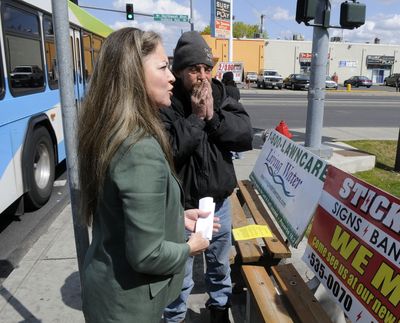Mayor orders companies to remove old benches
Ads will have to meet higher standards

After nearly three hours of passionate debate, the Spokane City Council agreed Monday to continue allowing advertising on bus benches.
Council members, however, heavily criticized existing bench ads and said the city must demand higher quality signs that meet aesthetic and accessibility standards.
The move came hours after Mayor Mary Verner publicly declared that she will stand by her order to advertising companies that their benches be removed by the end of the month to give a bench ad program “a fresh start.”
It’s unclear if there will be a gap between the removal of the current benches and installation of new ones.
Verner said her administration will immediately begin a bidding process for a short-term contract for sign companies to install benches at locations determined by the Spokane Transit Authority to be the busiest stops. That list includes 100, though some of those stops are at locations downtown and elsewhere that already have ad-free benches.
“My goal is to get bus benches that are actually usable,” Verner said.
She will also create a committee to examine higher standards for bench ads. Once those rules are agreed on, a second bidding process will begin to service a larger number of stops, she said.
Sunset Outdoor Advertising Manager Tom Townsend said after the meeting that with a bidding process in place, the company likely will comply with the city’s order as a sign of good faith. Sunset, which also goes by Emerald Outdoor, owns most of nearly 250 benches in city right-of-way. “That’s all I’ve been wanting,” he said.
Council President Joe Shogan lambasted Sunset for not removing the signs when its contract wasn’t renewed and for maintaining what he called poor-quality signs. “If I sound upset, you cannot with impunity break the law and say, ‘Gee whiz, I’m doing it for the good of the city!’ ” Shogan shouted.
Shogan several times interrupted Townsend when he was testifying to get him to admit the company no longer had a contract.
“Your trespassing on the city’s right of way,” said Shogan, who also interrupted Mike Fairburn, whose lawn care company is among those advertising on the benches.
Eventually, council members Mike Allen and Steve Corker appealed to the rest of the council to allow people to speak without interference.
“This is a disincentive to the people who came to testify,” Corker said.
More than a dozen people testified on the topic.
City administrators ordered the signs removed after Lamar Outdoor Advertising began putting up signs without a contract. Lamar said they had the right to do so because Sunset’s contract had run out. Verner and others point to a 2001 sign law that banned bus bench ads and say it’s well past the time to start enforcing it.
Last year, Verner worked with STA to transfer authority of benches to the agency. But the STA board, including Spokane City Council members Nancy McLaughlin and Al French, voted against the $38,000 contract, arguing it was an unnecessary expense because the current program doesn’t cost taxpayer money. They also criticized STA’s proposed benches because they were backless.
Councilman Richard Rush, who was the only STA board member to support purchase of the benches, sharply criticized French for playing politics with the benches. One woman, Margaret Simonson, brought up French’s ties with Sunset’s co-owner Tom Hamilton. Before Hamilton owned Sunset, three of Hamilton’s businesses contributed $6,800 worth of ads to French’s unsuccessful 2003 campaign for city council president.
“Despite your attempts to try to smear my reputation, it would be nice if you kept to the issue that’s before us,” French said, adding that he hasn’t used bus ads in campaigns since 2003.
French stressed that just because he supports allowing advertising doesn’t mean he’s happy with the current benches.
“I think we can do better,” French said. “I’m anxious to get through the next process.”
Rush cast the lone vote against French’s proposal to allow ads.
He said he could be persuaded to support bench ads but only if higher standards were developed and put in place first.
At a morning news conference near the corner of Indiana Avenue and Monroe Street, Verner pointed to a pair of benches that she said typifies the city’s problem with the current system.
The benches don’t match, they’re placed in the middle of the sidewalk for a bus stop on a busy corner, and there’s not much room for passing pedestrians or wheelchairs, she said. The backs of the benches also contain ads, to which some neighborhoods object.
Some benches around the city need repair and are unsafe, Verner said, although the two benches she was using to illustrate the problem had their wooden seats replaced recently.
Townsend said his company works fast to fix problems when brought to his attention. He said accessibility issues are easily fixed and concerns about bench conditions are exaggerated.